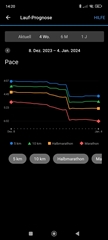I have switched from Forerunner 245 to Forerunner 965 recently (yes, Christmas present :)). On the day that I switched, the race predictions dropped enormously. Now, ten days later, the predictions are still way off, they are worse than all my PR's.
Does the Forerunner 965 use a different algorithm than the 245? And why does a newer model show worse predictions?


